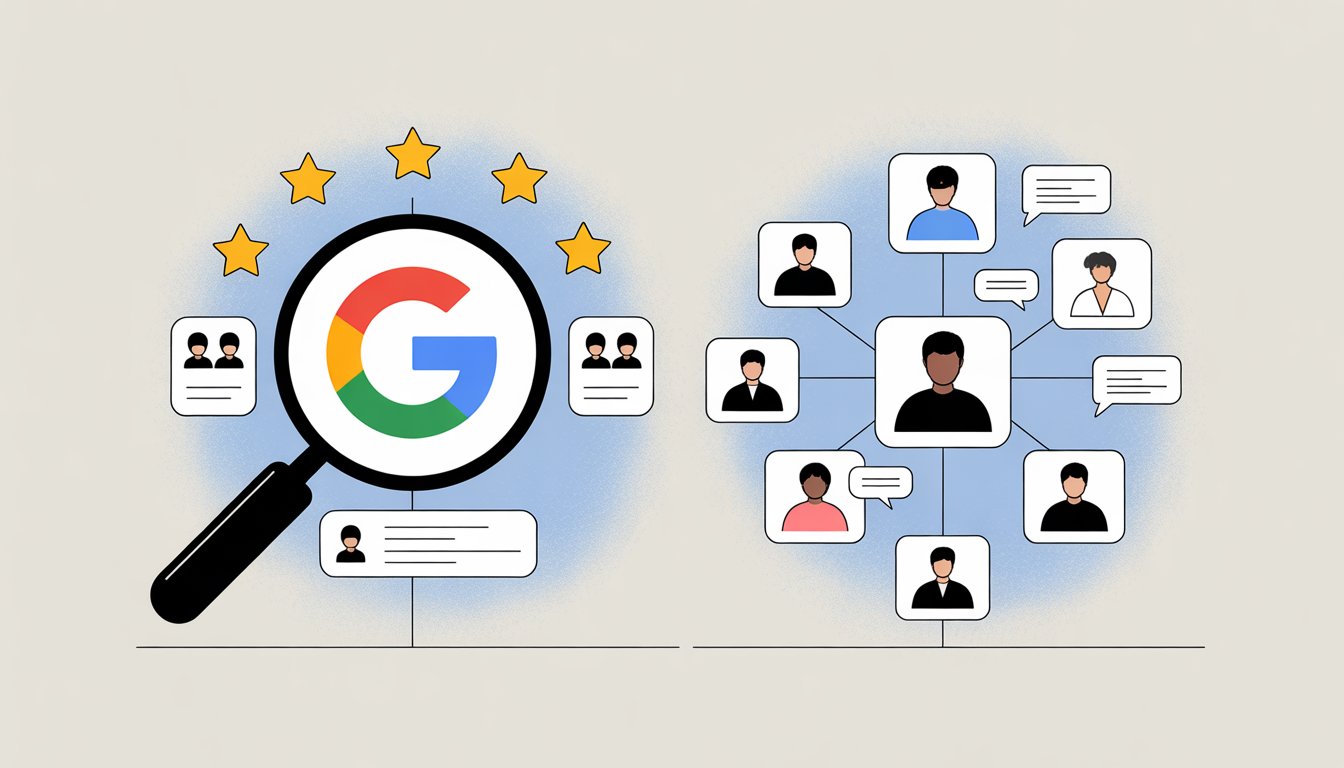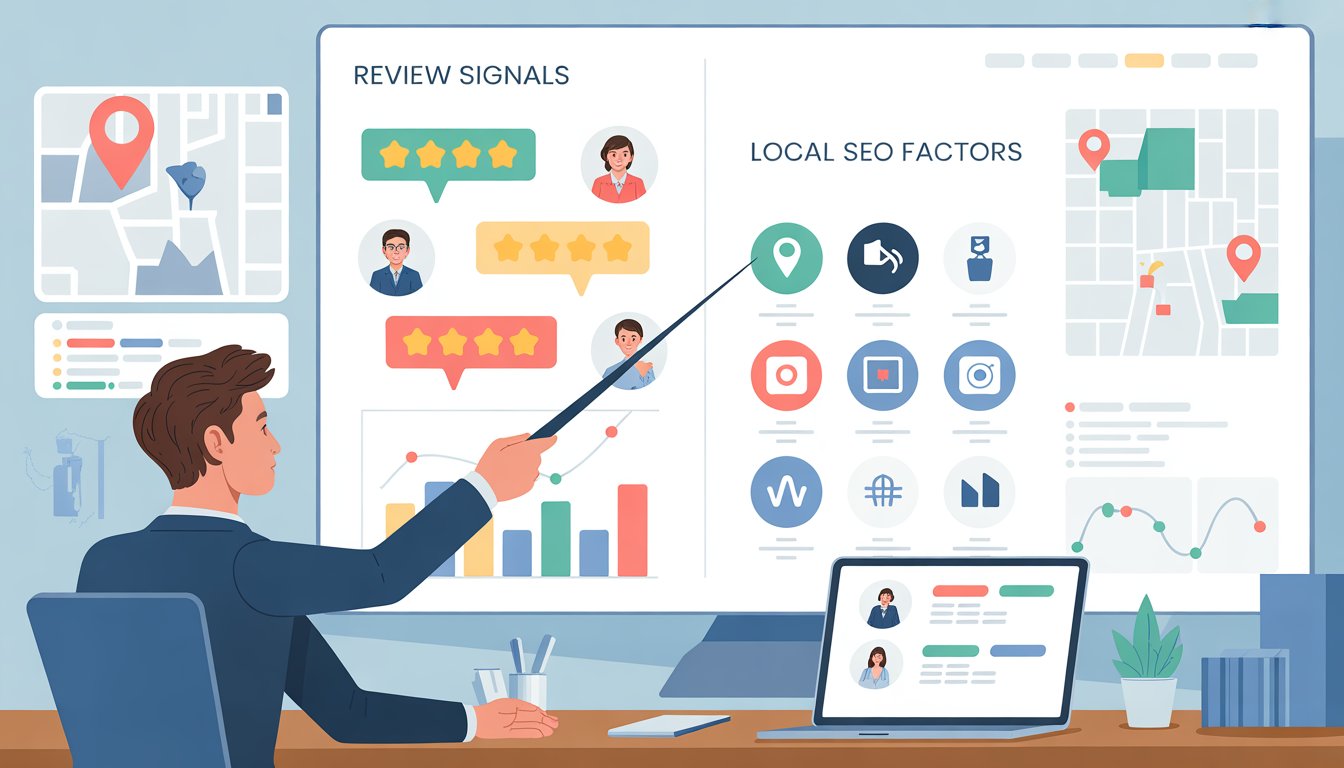When you're building your business's online reputation, the question isn't whether you need reviews – it's where to focus your efforts.
Many business owners feel torn between concentrating on Google reviews or spreading their time across multiple platforms like Yelp, Facebook, and TripAdvisor.
The decision can impact your local search rankings, customer trust, and how efficiently you use your limited time and resources.

For most small businesses with limited resources, focusing primarily on Google reviews delivers the best return on investment because Google holds 73% of all online reviews and directly influences your local search rankings.
Google processes 81% of all searches, making it the platform where your customers are most likely to discover and evaluate your business.
When you concentrate your efforts on Google, you're investing in the platform that offers the greatest visibility and SEO benefits.
However, the right strategy depends on your business type, target audience, and available resources.
Some businesses benefit from a multi-platform approach, especially if they serve specific industries or demographics that rely heavily on specialized review sites.
The key is understanding which platforms your customers actually use and where your efforts will create the most impact for your business goals.
Key Takeaways
- Google reviews should be your primary focus because they reach the most customers and boost local search rankings
- Multi-platform strategies work best for businesses with dedicated resources and industry-specific customer bases
- Your review strategy should match your business type, target audience, and available time for managing responses
The Importance of Online Reviews for Businesses

Online reviews have become a critical factor in business success, with 92% of consumers now trusting online reviews as much as personal recommendations.
These digital testimonials build customer trust, influence purchasing decisions, and provide valuable feedback that drives business improvements.
Building Brand Trust and Social Proof
Customer reviews serve as powerful trust signals for potential buyers.
When people see positive feedback from real customers, it creates social proof that your business delivers on its promises.
Studies show that businesses with higher review ratings receive significantly more customer interest.
A 4.5-star rating or higher can increase click-through rates by 25% compared to lower-rated competitors.
Key trust factors include:
- Verified customer experiences
- Consistent positive feedback
- Professional responses to all reviews
- Recent and regular review activity
Brand trust develops when customers see authentic stories from other buyers.
These real experiences carry more weight than traditional advertising because they come from unbiased sources.
Response management also builds trust.
When you reply to both positive and negative reviews professionally, it shows you care about customer satisfaction and are willing to address concerns.
Influencing Customer Decisions with Social Proof
Online reviews directly impact purchasing decisions at multiple stages of the customer journey.
Research indicates that positive reviews activate reward centers in the brain, creating anticipation and desire for products or services.
Review influence occurs through:
- Authority - Reviews from verified customers carry credibility
- Relatability - Customers trust people with similar backgrounds
- Recency - Fresh reviews show current business performance
The psychological principle of social proof means customers look to others' actions to guide their own choices.
When potential buyers see many positive reviews, they feel confident about making a purchase.
Negative reviews can cost businesses up to 30 customers per review.
However, a mix of reviews often appears more authentic than perfect ratings, as customers expect some variation in experiences.
Visual elements like star ratings provide quick decision-making cues that influence customer behavior before they even read detailed feedback.
Supporting Business Growth Through Feedback
Customer feedback through reviews creates a direct path for business improvement and growth.
This information helps identify strengths to promote and weaknesses to address.
Reviews provide insights into:
- Product quality and performance issues
- Customer service effectiveness
- Pricing competitiveness
- Operational improvements needed
Businesses that actively use review feedback to make changes often see improved customer satisfaction scores.
Review data also supports marketing efforts by highlighting popular products, common customer benefits, and compelling success stories.
Many businesses use positive review quotes in their promotional materials.
The feedback loop helps you stay competitive by understanding what customers value most.
This knowledge guides product development, service improvements, and strategic business decisions that drive long-term growth.
Google Reviews: Advantages and Limitations

Google reviews offer significant benefits for search rankings and business visibility, while also presenting some challenges businesses should understand.
These reviews work directly with Google My Business to boost your online presence through improved search performance.
Impact on SEO and Local Online Visibility
Google reviews directly influence your local SEO rankings.
The search engine uses review quantity, quality, and recency as ranking factors in its local algorithm.
Businesses with more positive reviews rank higher in local search results.
This happens because reviews contribute to your business's "prominence" factor, which measures how well-known and reputable you are.
Key SEO benefits include:
- Higher placement in Google Maps listings
- Improved visibility in local search results
- Increased trust signals for Google's algorithm
Your review star rating appears in search results.
This visual element helps potential customers choose your business over competitors before they even visit your website.
Google houses 73% of all internet reviews.
This massive volume means your Google reviews reach more potential customers than reviews on other platforms.
Fresh reviews signal to Google that your business is active.
Regular new reviews can boost your search rankings more than older reviews from other sites.
Integration with Google My Business
Google reviews connect seamlessly with your Google My Business profile.
This integration creates multiple touchpoints where customers can see your reviews across Google's services.
Your reviews appear on Google Search, Google Maps, and your business knowledge panel.
This widespread visibility increases the chances customers will see your reviews during their research process.
Integration features include:
- Automatic review display across Google platforms
- Review response tools within Google My Business
- Review insights and analytics
- Photo reviews that enhance your business listing
You can respond to reviews directly through your Google My Business dashboard.
Quick responses show potential customers that you care about feedback and customer service.
Review management becomes simpler when everything runs through one platform.
You don't need separate tools or accounts to monitor and respond to feedback.
Role in Enhancing Online Presence
Google reviews build credibility and trust with potential customers.
When people see high ratings and positive feedback, they view your business as reliable and worth their money.
Ways reviews enhance your presence:
- Social proof that influences buying decisions
- Content that appears in search results
- Competitive advantage over businesses with fewer reviews
- Customer insights that help improve your services
Reviews provide authentic customer voices about your business.
This user-generated content often ranks well in search results and gives potential customers real experiences to consider.
Negative reviews offer improvement opportunities.
You can address concerns publicly and show how you handle problems, which often impresses potential customers more than perfect ratings.
Google reviews trend more positively than other platforms.
The same business typically has higher ratings on Google compared to sites like Yelp or TripAdvisor, making you look better to potential customers.
Exploring Other Review Platforms
Each major review platform serves different industries and customer types.
Yelp dominates local service searches, TripAdvisor controls travel decisions, and specialized sites like Trustpilot focus on e-commerce trust.
Yelp for Service-Based Businesses
Yelp remains the top choice for local service providers like restaurants, salons, and contractors.
The platform drives real traffic and leads to businesses.
Review count and recency matter most on Yelp.
Unlike Google, Yelp's ranking system heavily favors businesses with frequent, recent reviews.
Even one or two new reviews monthly can boost your visibility significantly.
Yelp profiles often rank higher than business websites in Google search results.
This makes your Yelp presence a second website that potential customers will find.
The platform attracts high-intent buyers who are ready to make decisions.
Users typically visit Yelp when they're actively searching for a service provider in their area.
Key Yelp benefits:
- High buyer intent traffic
- Strong local SEO impact
- Industry-specific search focus
- Mobile-first user experience
Your Yelp strategy should focus on consistent review requests and quick responses to feedback.
TripAdvisor for Travel and Hospitality
TripAdvisor controls travel-related review searches for hotels, restaurants, attractions, and tour operators.
The platform influences booking decisions more than any other review site in the travel industry.
TripAdvisor reviews directly impact booking rates.
Hotels and restaurants with strong TripAdvisor profiles see measurable increases in reservations and walk-in traffic.
The platform's global reach makes it essential for businesses targeting tourists or travelers.
Local restaurants in tourist areas need TripAdvisor reviews as much as hotels do.
TripAdvisor integrates with booking platforms and travel sites.
Your reviews appear across multiple travel websites, extending your reach beyond the main platform.
Travel businesses should prioritize TripAdvisor because:
- Travelers trust it most for booking decisions
- Reviews appear on partner booking sites
- Global audience discovery
- Direct booking integration options
Focus on post-visit review requests and photo submissions to maximize impact.
Trustpilot, Feefo, and Reputation Sites
Trustpilot and Feefo serve e-commerce businesses and service providers who need credibility badges and trust signals.
These platforms focus on verified customer experiences.
Trustpilot offers verified review collection through direct customer invitations.
This verification process makes reviews more trustworthy for online shoppers who can't visit physical locations.
Feefo specializes in post-purchase review collection for online retailers.
The platform integrates with e-commerce systems to automatically request reviews after transactions.
These reputation sites provide trust badges and widgets you can display on your website.
The visual trust signals can increase conversion rates for online sales.
Benefits of specialized review platforms:
- Verified customer validation
- Website integration options
- Industry-specific credibility
- Automated review collection systems
Service providers and online retailers should consider these platforms for building customer confidence and improving website conversions.
Benefits of a Multi-Platform Review Strategy
Spreading your review efforts across multiple platforms can expand your customer reach and provide deeper insights into customer preferences.
This approach also reduces your dependence on any single platform and builds stronger online reputation protection.
Expanding Online Reach and Audience Diversity
Different review platforms attract different types of customers.
Yelp draws food and service seekers, while TripAdvisor focuses on travel customers.
By using multiple review platforms, you reach customers who might never see your Google reviews.
Some people trust specialized platforms more than general search engines.
Research shows businesses using multiple platforms see a 23% increase in revenue compared to single-platform strategies.
Each platform acts as a new door for potential customers to find you.
Platform-specific audiences include:
- Yelp: Local diners and service seekers
- Facebook: Social media users and community members
- Industry sites: Specialized professional audiences
- Amazon: Product buyers and researchers
Your customer feedback becomes visible to people who prefer different websites.
This creates more chances for new customers to discover your business and read positive reviews.
Gaining Richer Insights from Diverse Feedback
Multiple platforms give you a fuller picture of customer opinions.
Each platform attracts different customer types with unique concerns and preferences.
Google reviews might focus on location and convenience.
Yelp reviews often discuss service details and atmosphere.
Facebook reviews may highlight personal experiences and emotions.
This variety helps you understand your business from different angles.
You learn what matters most to different customer groups.
Benefits of diverse customer feedback:
- Spot trends across different customer types
- Find problems that only show up on certain platforms
- Learn which features appeal to specific audiences
- Get ideas for improving different parts of your business
Collecting feedback from multiple review platforms gives you better understanding of customer opinions.
You can make smarter business decisions when you know what different types of customers really think.
Mitigating Risks with Platform Diversity
Relying on one platform puts your online reputation at risk.
Algorithm changes or policy updates can hurt your visibility overnight.
Platform diversity protects you from:
- Sudden algorithm changes that hide your reviews
- Technical problems that make platforms unavailable
- Policy changes that affect how reviews appear
- Negative review attacks focused on one site
If problems hit one platform, your other review platforms keep building trust with customers.
Your online reputation stays stable even when individual sites have issues.
Multiple platforms also make it harder for competitors to damage your reputation.
Bad actors would need to target several sites instead of just one.
This review strategy creates backup protection for your business reputation.
You maintain customer trust even when individual platforms face problems or changes.
Responding and Managing Reviews Across Platforms
Managing reviews requires quick responses and smart tracking to protect your online reputation.
Positive reviews become powerful tools when you use them to show potential customers what others think about your business.
Best Practices for Responding to Reviews
Respond to all reviews within 24-48 hours. Quick responses show you care about customer experience and value feedback.
For positive reviews:
- Thank the customer by name.
- Mention specific details they shared.
- Invite them to return or try other services.
For negative reviews:
- Stay calm and professional.
- Apologize for their poor experience.
- Offer to fix the problem offline.
- Provide contact information for follow-up.
Keep responses short and personal. Avoid copying the same message for every review.
Each response should feel genuine and specific to that customer's experience. Always stay professional, even with unfair reviews.
Other customers read your responses to judge how you handle problems.
Monitoring Customer Experience and Sentiment
Set up alerts for new reviews on Google, Facebook, and other platforms you use. Most platforms send email notifications when customers leave reviews.
Check your reviews at least twice per week. Regular monitoring helps you catch problems early and respond quickly.
Look for patterns in negative feedback. If multiple customers mention the same issue, fix it in your business operations.
Track your average rating over time. A dropping score signals customer experience problems that need attention.
Use review monitoring tools if you have multiple locations or get many reviews. These tools collect all your reviews in one place and send instant alerts.
Leveraging Positive Reviews for Social Proof
Share your best reviews on social media and your website. Positive reviews from real customers build trust with new prospects.
Ask happy customers to leave reviews at the right moment. Send review requests after successful purchases or positive interactions.
Create a reviews page on your website. Display recent positive reviews with customer names and star ratings.
Use review snippets in your marketing materials. Short quotes from satisfied customers work well in ads and brochures.
Highlight specific benefits customers mention in reviews. If multiple people praise your fast service or helpful staff, feature those strengths in your marketing.
Respond to positive reviews to encourage more feedback. Customers see that you appreciate their time and are more likely to share their experiences.
Choosing the Right Review Strategy for Your Business
Your business type, customer base, and growth stage determine whether to focus solely on Google reviews or expand across multiple platforms. Service providers often benefit from platform-specific approaches.
Local businesses typically see better results with concentrated Google efforts.
Assessing Your Target Audience
Your customers' review habits shape your strategy. Research where your target audience actually reads reviews before making purchases.
Age demographics matter significantly:
- Customers under 35 often check multiple platforms.
- Customers over 45 primarily use Google for reviews.
- Business-to-business customers focus on industry-specific sites.
Survey your existing customers about their review reading habits. Ask them which platforms they trust most when choosing service providers.
Monitor your current review sources. Check Google Analytics to see which review platforms drive traffic to your website.
Different customer groups use different platforms. Restaurant customers might check Yelp, while home service customers rely heavily on Google reviews.
Industry-Specific Considerations
Your industry determines which platforms carry the most weight with potential customers.
Platform priorities by business type:
Business TypePrimary PlatformSecondary OptionsRestaurantsGoogle ReviewsYelp, TripAdvisorProfessional ServicesGoogle ReviewsIndustry directoriesRetail StoresGoogle ReviewsFacebook, AmazonHotelsGoogle ReviewsTripAdvisor, Booking.com
Service providers like plumbers, lawyers, and contractors see the best results from Google-focused strategies. Local business customers search Google first for these services.
Professional service firms benefit from industry-specific review sites. Legal directories and medical review platforms carry extra credibility in these fields.
Retail businesses need broader coverage. Customers shop around more and check multiple sources before buying products.
Scaling Review Efforts for Business Growth
Start with Google reviews regardless of your business size. This platform delivers the highest return on your time investment.
Small businesses with limited resources should focus entirely on Google. Manage one platform well rather than several platforms poorly.
Growing businesses can expand to 2-3 platforms once Google review management runs smoothly. Add platforms that your target audience actually uses.
Resource allocation for different business stages:
- Startup: 100% Google focus
- Established local business: 70% Google, 30% other platforms
- Multi-location business: Automated tools across key platforms
Track which platforms generate actual customers, not just views. Some review sites bring traffic but few conversions.
Business growth requires systematic review collection. Create processes that make leaving reviews simple for satisfied customers across your chosen platforms.
Frequently Asked Questions
Business owners often have specific questions about review platform strategy and management.
What are the benefits of concentrating on Google reviews for my business?
Google holds six times more reviews than its three nearest competitors combined. When you focus on Google, you reach 81% of search engine users who rely on Google for information.
Your Google reviews directly boost your local SEO rankings. Google's algorithm uses review quantity, quality, and recency to determine where your business appears in search results.
Google reviews integrate across Google Search, Maps, and other Google services. This means your reviews appear in multiple places where customers look for businesses.
You save time and resources by managing one platform instead of many. Most businesses lack the staff to monitor dozens of review sites effectively.
Google reviews tend to be more positive than other platforms. The same business typically scores higher on Google than on Yelp or TripAdvisor.
How do different review platforms impact my online reputation and visibility?
Google reviews have the biggest impact on your visibility because Google dominates search. Your Google rating appears in search results and Google Maps listings.
Specialized platforms like Yelp or TripAdvisor serve specific niches. They may attract certain demographics but have much smaller audiences than Google.
Different platforms have different moderation policies. Google allows ratings without text, while other sites require written reviews.
Your ratings often vary between platforms. The same business usually gets higher scores on Google than on stricter review sites.
Is it more effective to have a larger number of reviews on one platform or a few reviews across multiple platforms?
Having many reviews on Google is more effective than spreading few reviews across multiple platforms. Google houses 73% of all internet reviews.
A high volume of Google reviews builds stronger trust with customers. People see many positive reviews and view your business as reliable.
Search engines favor businesses with many reviews on the dominant platform. Google's algorithm rewards businesses with substantial review activity.
Managing one platform with many reviews is easier than tracking reviews across many platforms. You can respond faster and more consistently.
What strategies should businesses employ to effectively manage their online reviews?
Focus your efforts on Google Business Profile first. Optimize your profile and respond to reviews promptly on this primary platform.
Share direct links to your Google Reviews page across your marketing channels. Make the review process as easy as possible for customers.
Respond to all reviews professionally and quickly. Thank positive reviewers and address negative feedback constructively.
Ask satisfied customers to leave Google reviews specifically. Don't spread requests across multiple platforms if you have limited resources.
Monitor your Google reviews regularly using Google's built-in tools. Set up notifications so you know when new reviews arrive.
How important are review platforms in influencing consumer decision-making?
Reviews are critical for consumer decisions. 89% of consumers read online reviews before making purchases.
Google reviews carry the most weight because most people use Google to research businesses. Your Google rating often determines if customers contact you.
Positive reviews build immediate trust with potential customers. They see high ratings and assume your business provides quality service.
Review recency matters for decision-making. Fresh reviews show your business is active and currently serving customers well.
The number of reviews also influences decisions. Businesses with many reviews appear more established and trustworthy.
What is the role of diversity in online review platforms for a robust digital presence?
Multiple platforms can provide broader feedback about your business. Different sites may attract different types of customers and comments.
However, platform diversity requires significant time and resources to manage effectively. Most small businesses cannot monitor all review sites properly.
Google's massive reach means focusing there covers most of your potential customers. You get maximum impact with minimum effort.
Industry-specific platforms may be worth considering for certain businesses. Restaurants might benefit from specialized food review sites.










